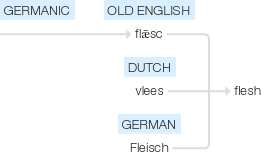Flesh
Old English flǣsc, of Germanic origin; related to Dutch vlees and German Fleisch .
wiktionary
From Middle English flesh, flesch, flæsch, from Old English flǣsċ, from Proto-West Germanic *flaiski, from Proto-Germanic *flaiski, from Proto-Indo-European *pleh₁ḱ-(“to tear, peel off”)
etymonline
flesh (n.)
Old English flæsc "flesh, meat, muscular parts of animal bodies; body (as opposed to soul)," also "living creatures," also "near kindred" (a sense now obsolete except in phrase flesh and blood), from Proto-Germanic *flaiska-/*fleiski- (source also of Old Frisian flesk, Middle Low German vlees, German Fleisch "flesh," Old Norse flesk "pork, bacon"), which is of uncertain origin; according to Watkins, originally "piece of meat torn off," from PIE *pleik- "to tear," but Boutkan suspects a northern European substratum word.
Of fruits from 1570s. Figurative use for "carnal nature, animal or physical nature of man" (Old English) is from the Bible, especially Paul's use of Greek sarx, and this led to sense of "sensual appetites" (c. 1200).
Flesh-wound is from 1670s; flesh-color, the hue of "Caucasian" skin, is first recorded 1610s, described as a tint composed of "a light pink with a little yellow" [O'Neill, "Dyeing," 1862]. In the flesh "in a bodily form" (1650s) originally was of Jesus (Wyclif has up the flesh, Tindale after the flesh). An Old English poetry-word for "body" was flæsc-hama, literally "flesh-home." A religious tract from 1548 has fleshling "a sensual person." Flesh-company (1520s) was an old term for "sexual intercourse."
flesh (v.)
1520s, "to render (a hunting animal) eager for prey by rewarding it with flesh from a kill," with figurative extensions, from flesh (n.). Meaning "to clothe or embody with flesh," with figurative extensions, is from 1660s. Related: Fleshed; fleshing.
